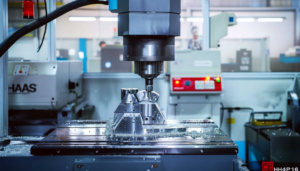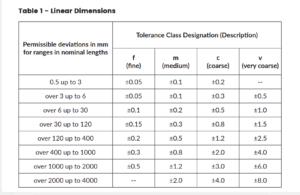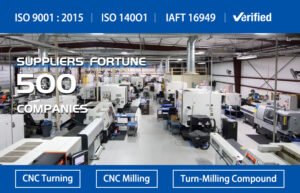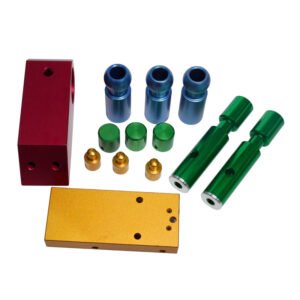CNC (Computer Numerical Control) machining is a critical technology in modern manufacturing, allowing for precise, automated control of machine tools. The choice of material in CNC machining is pivotal, influencing the performance, cost, and suitability of the final product. This blog will delve into a detailed comparison of metals—aluminum, steel, and titanium—and plastics used in CNC machining, outlining their advantages and limitations to help you make the best material selection for your projects.
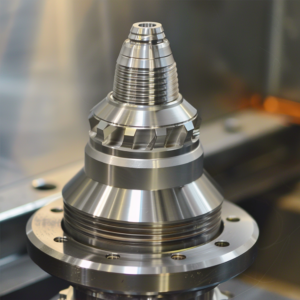
Metals in CNC Machining- Aluminum
Pros:
- Lightweight: Aluminum is about one-third the weight of steel, making it a top choice in industries like aerospace and automotive, where reducing weight is crucial for performance and fuel efficiency.
- High Machinability: Aluminum is known for its excellent machinability, allowing for faster cutting speeds and lower tool wear. This makes it cost-effective in terms of both machining time and tool longevity.
- Corrosion Resistance: One of aluminum’s standout features is its natural corrosion resistance, thanks to the thin oxide layer that forms on its surface, protecting it from rust and other forms of corrosion.
- Thermal Conductivity: Aluminum’s high thermal conductivity makes it ideal for heat dissipation applications, such as heat sinks in electronic devices.
Cons:
- Lower Strength: While aluminum is strong for its weight, it doesn’t match the tensile strength of steel or titanium. This limits its use in applications that require high load-bearing capacity.
- Softness: Aluminum’s relative softness compared to other metals can lead to wear and deformation over time, especially in high-stress environments.
Steel
Pros:
- High Strength: Steel is renowned for its high tensile strength and durability, making it suitable for structural components and applications that demand heavy load-bearing capability.
- Versatility: The wide variety of steel grades and alloys available means it can be tailored to specific requirements, such as increased hardness, toughness, or corrosion resistance.
- Cost-Effective: Generally, steel offers a good balance of performance and cost, making it a popular choice for many engineering applications.
- Wear Resistance: Steel’s inherent hardness and toughness make it highly resistant to wear and abrasion, ensuring longevity in demanding conditions.
Cons:
- Weight: Steel’s density is higher than that of aluminum and titanium, which can be a drawback in applications where weight is a critical factor.
- Corrosion: Unless treated or coated, steel is prone to rust and corrosion. This often necessitates additional protective measures, such as painting, galvanizing, or applying other coatings, which can add to the overall cost.
Titanium
Pros:
- High Strength-to-Weight Ratio: Titanium combines excellent strength with relatively low weight, making it ideal for high-performance applications in aerospace, medical devices, and sporting goods.
- Corrosion Resistance: Titanium offers exceptional resistance to corrosion, even in harsh environments like seawater and acidic conditions, which makes it valuable for chemical processing and marine applications.
- Biocompatibility: Its compatibility with the human body makes titanium a preferred material for medical implants and devices.
- Heat Resistance: Titanium retains its mechanical properties at high temperatures better than most other metals, making it suitable for high-temperature applications.
Cons:
- Cost: The extraction and processing of titanium are expensive, making it one of the costliest materials for CNC machining.
- Machinability: Titanium’s hardness and propensity to cause tool wear make it challenging to machine. It requires specialized equipment and techniques, which can increase production time and costs.
Plastics in CNC Machining
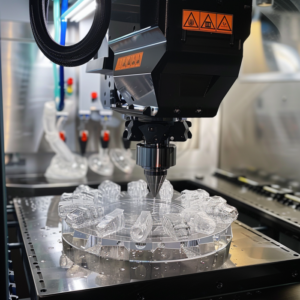
Advantages of Plastics
- Lightweight: Plastics are significantly lighter than metals, offering substantial weight savings, which is beneficial for applications like consumer electronics and automotive components where weight reduction can improve performance and efficiency.
- Corrosion Resistance: Plastics do not rust and are highly resistant to many chemicals, making them ideal for applications in harsh or corrosive environments.
- Electrical Insulation: Many plastics have excellent insulating properties, which are crucial for electrical and electronic components, providing safety and reliability in their applications.
- Cost-Effective: Plastics are generally cheaper than metals in terms of both material cost and machining expenses. They can be produced in large quantities at lower costs, making them suitable for high-volume manufacturing.
Limitations of Plastics
- Lower Strength: Plastics do not match the tensile strength and durability of metals. This limits their use in high-stress or load-bearing applications.
- Thermal Sensitivity: Plastics can soften, deform, or degrade at high temperatures, making them unsuitable for environments with significant heat exposure.
- Dimensional Stability: Plastics can exhibit greater dimensional changes due to temperature fluctuations and moisture absorption, which can affect the precision and stability of the parts.
- Surface Finish: Achieving a high-quality surface finish on plastic parts can be more challenging compared to metals and may require additional processing steps.
Comparing Metals and Plastics in CNC Machining
Application Suitability
- Metals: Metals like aluminum, steel, and titanium are preferred for high-strength, high-temperature, and high-stress applications. They are ideal for structural components, aerospace parts, automotive engines, and medical implants.
- Plastics: Plastics are better suited for applications where weight reduction, corrosion resistance, and electrical insulation are crucial. Examples include consumer electronics, automotive interior components, and chemical-resistant parts.
Cost Considerations
- Metals: Generally, metals are more expensive than plastics, with titanium being the most costly due to its complex processing requirements. Aluminum offers a good balance between cost and performance, while steel provides a cost-effective solution with excellent strength and durability.
- Plastics: Plastics are typically less expensive and can be cost-effective for high-volume production runs. However, their lower strength and thermal stability can limit their use in certain applications.
Machining Challenges
- Metals: Machining metals like aluminum is relatively straightforward, while steel and titanium present more challenges due to their hardness and tool wear. Specialized tools and techniques are often required for titanium.
- Plastics: Machining plastics can be easier on the tools but may require careful control of cutting speeds and feeds to prevent melting or deformation. Achieving tight tolerances and high-quality surface finishes can also be more demanding.
Selecting the right material for CNC machining depends on various factors, including the application’s requirements, budget constraints, and environmental conditions. Metals like aluminum, steel, and titanium offer excellent strength, durability, and versatility but come with different costs and machining challenges. Plastics provide lightweight, corrosion-resistant, and cost-effective solutions but may lack the strength and thermal stability of metals.
By understanding the pros and cons of each material, you can make informed decisions that best suit your project’s needs. Whether you prioritize strength, weight, cost, or environmental resistance, there is a material that fits your CNC machining requirements. This knowledge will enable you to optimize the performance, cost, and longevity of your products, ensuring they meet the highest standards of quality and functionality.



